自考英语语法讲义及练习
自考英语(下)讲义和课后答案

目录Unit 1 (1)Unit 2 (4)Unit 3 (7)Unit 4 (10)Unit 5 (13)Unit 6 (16)Unit 7 (18)Unit 8 (21)Unit 9 (24)Unit 10 (26)Unit 11 (29)Unit 12 (32)Unit 13 (36)Unit 14 (40)Unit 15 (43)Unit 1第一部分 Text A【课文译文】什么是决策决策是从可供挑选的行动方案中作出选择,目的在于确定并实现组织机构的目标或目的。
之所以要决策是因为存在问题,或是目标或目的不对,或某种东西妨碍目标或目的实现。
因此,决策过程对于管理人员非常重要。
管理者所做的一切几乎都与决策有关,事实上,有人甚至认为管理过程就是决策过程。
虽然决策者不能预测未来,但他们的许多决策要求他们必须考虑未来可能会发生的情况。
管理者必须对未来的事情作出最佳的猜测,并使偶然性尽可能少地发生。
但因为总是存在着未知情况,所以决策往往伴随着风险。
有时失误的决策带来的后果不很严重,但有时就会不堪设想。
选择就是从多种选项中进行取舍,没有选择,就没有决策。
决策本身就是一个选择的过程,许多决策有着很广的选择范围。
例如,学生为了实现自己获得学位的目标,可能会从多门课程中进行选择,对于管理者来说,每一个决策都受到政策、程序、法律、惯例等方面的制约,这些制约存在于一个组织的各个部门里。
选项就是可供选择的种种可行的行动方案。
没有选项,就没有选择,因而也就没有决策。
如果看不到任何选项,这意味着还没有对问题进行彻底的研究。
例如,管理者有时会用“非此即彼”的方式处理问题,这是他们简化问题的方法。
这种简化问题的习惯常常使他们看不到其他的选项。
在管理这个层次上,制定决策包括:识别选项和缩小选项范围,其范围小到微乎其微,大到近乎无限。
决策者必须有某种方法来断定几种选项中的最佳选项,即哪个选项最有利于实现其组织的目标。
组织的目标是指该组织努力完成或达到的目标或现状。
自考《英语二》讲义

自考《英语二》讲义自考“英语(二)”完整讲义讲义一T ext A What Is a Decision ?I.课文内容简介决策的目的是制定和实现组织目标。
作决策的原因是有问题存在、目标和目的不正确、或者有某种东西防碍目标或目的的实现。
作决策的过程对管理人员来说至关重要。
决策者必须具备从多个可供选择的可能性中确定最佳选择的手段。
而多种目标的顺序和重要性也部分地基于决策者的价值观。
今天所作的决策可能会对将来产生深远的影响。
因此,有经验的管理者能从当前决策看到将来的效果。
II.New WordsOrganizational a. 组织上的goal n. 目的,目标objective n./ a. 目标,目的/客观的,真实的Accomplish vt. 完成(任务等)predict vt./vi. 预言;预示accompany vt. 伴随,陪同Implement vt. 实现;完成Constraint n. 强制;强制因素precedent n. 先例,前例Simplify vt. 简化tendency n. 趋势,倾向Managerial a. 经理的,管理人的maker n. 制造者;制造商Achievement n. 完成,达到attain vt. 达到;完成optimal a. 最适宜的,最理想的suboptimization n. 局部最优化trade-off n. 权衡;物物交换argue vt./vi. 争辩,争论budget n./vt. 预算scheme n./vt.把… 编入预算define vt. 解释,给…下定义Multiple a./n.多样的,复合的/倍数Profitability n. 赚钱,获利correctness n. 正确,正确性unintended a. 非计划中的,非故意的ongoing a. 进行中的,非故意的entity n. 存在,实体Skilled a. 熟练的;有技能的in the way 挡路、碍事to make a guess at 猜测and the like 等等,诸如此类to seek to 追求,争取in part 部分地,在某种程度上point of view 观点词汇精讲1.goal n. 目标,进球,球门(同义词:aim ,end ,purpose,objective)Her goal is a place at university . 她的目标是在大学任教。
英语语法讲解及练习大全(附答案)

Contents第一部分语法讲解第一讲词类、句子成分、构词法 (3)第二讲名词 (4)第三讲代词 (6)第四讲数词 (9)第五讲冠词 (10)第六讲形容词和副词 (12)第七讲介词 (19)第八讲动词(一)动词概述 (21)第九讲动词(二)动词时态和语态 (25)第十讲动词(三)非谓语动词及动词辨析 (29)第十一讲连词 (35)第十二讲简单句 (36)第十三讲句子成分 (39)第十四讲简单句句式 (42)第十五讲并列句和主从复合句 (43)第二部分巩固与提高测评测评一名词 (47)测评二代词 (48)测评三数词 (51)测评四冠词 (52)测评五形容词和副词 (54)测评六介词 (58)测评七动词 (60)测评八连词 (69)测评九句子 (70)测评十交际用语 (75)第三部分语法网络图第一讲:词类、句子成分和构词法:2、代词(pron.):主要用来代替名词。
如:who, she, you, it .3、形容词(adj..):表示人或事物的性质或特征。
如:good, right, white, orange .4、数词(num.):表示数目或事物的顺序。
如:one, two, three, first, second, third, fourth.5、动词(v.):表示动作或状态。
如:am, is,are,have,see .6、副词(adv.):修饰动词、形容词或其他副词,说明时间、地点、程度等。
如:now, very, here, often, quietly, slowly.7、冠词(art..):用在名词前,帮助说明名词。
如:a, an, the.8、介词(prep.):表示它后面的名词或代词与其他句子成分的关系。
如in, on, from, above, behind.9、连词(conj.):用来连接词、短语或句子。
如and, but, before .10、感叹词(interj..)表示喜、怒、哀、乐等感情。
自考学士学位英语考试复习资料(语法词汇短词阅读作文)
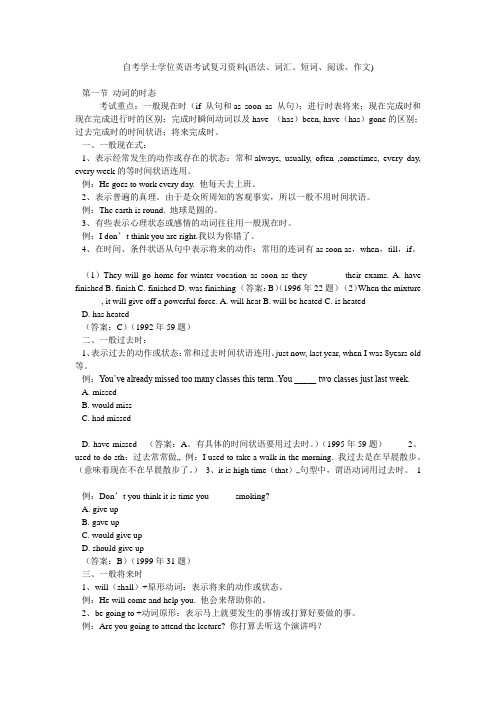
自考学士学位英语考试复习资料(语法、词汇、短词、阅读、作文)第一节动词的时态考试重点:一般现在时(if 从句和as soon as 从句);进行时表将来;现在完成时和现在完成进行时的区别;完成时瞬间动词以及have (has)been, have(has)gone的区别;过去完成时的时间状语;将来完成时。
一、一般现在式:1、表示经常发生的动作或存在的状态:常和always, usually, often ,sometimes, every day, every week的等时间状语连用。
例:He goes to work every day. 他每天去上班。
2、表示普遍的真理。
由于是众所周知的客观事实,所以一般不用时间状语。
例:The earth is round. 地球是圆的。
3、有些表示心理状态或感情的动词往往用一般现在时。
例:I don’t think you are right.我以为你错了。
4、在时间、条件状语从句中表示将来的动作:常用的连词有as soon as,when,till,if。
(1)They will go home for winter vocation as soon as they ________their exams. A. have finished B. finish C. finished D. was finishing (答案:B)(1996年22题)(2)When the mixture ______, it will give off a powerful force. A. will heat B. will be heated C. is heatedD. has heated(答案:C)(1992年59题)二、一般过去时:1、表示过去的动作或状态:常和过去时间状语连用。
just now, last year, when I was 8years old 等。
自考“英语(二)”完整讲义(124)

3.of…importance 有…重要性 4.in the strict sense 在严格的意义上 They are not immigrants, at least not in the strict sense. 从严格意义上来说他们不是移民。
5.of…interest 有…兴趣 6.to coincide with 相符,⼀致 7.attitude towards 对…的态度;意见 What is your attitude to/towards this idea?你对这个想法的态度如何? 8.at a guess 凭猜测 9.to go in for 参加,从事;以…为兴趣,爱好 compel devide get rid of What sports do you go in for?你喜欢什么运动? He goes in for pop music. 他喜欢流⾏⾳乐。
The boy goes in for stamp collecting. 这个男孩喜欢集邮。
10.to get one's teeth into 死死咬住,紧紧抓住;认真对待 Work, Labor, and Play So far as I know, Miss Hannah Arendt was the first person to define the essential difference between work and labor. To be happy, a man must feel, firstly, free and, secondly, important. He cannot be really happy if he is compelled by society to do what he does not enjoy doing, or if what he enjoys doing is ignored by society as of no value or importance.(1)In a society where slavery in the strict sense has been abolished, the sign that what a man does is of social value is that he is paid money to do it, but a laborer today can rightly be called a wage slave.(2)A man is a laborer if the job society offers him is of no interest to himself but he is compelled to take it by the necessity of earning a living and supporting his family.(3) 1.本句中,as of no value or importance 在if 从句中作主语补⾜语, as 在这⾥是介词,解释为“作为…”“be ignored by society as …”被社会作为毫⽆价值或⽆关紧要的东西⽽忽视。
自考英语(二)课文语法讲解unit 4 work is a blessing
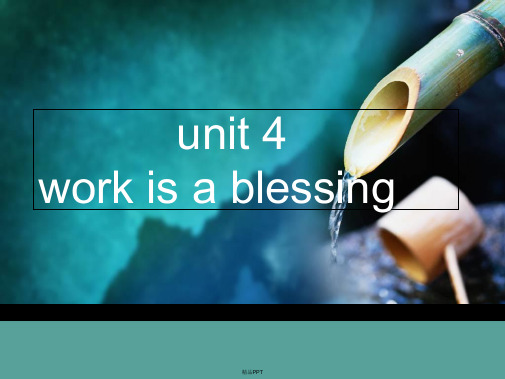
精品PPT
主语+should, would might, could+动词 原形
eg:If I had time, I would attend the meeting. If he had hurried ,he could have caught the train. If I were to go abroad ,I would go to America.
精品PPT
New words
look forward to
期望,盼望;瞩望 I look forward to hearing from you in the near future. 我盼望着不久收到你的信。有些人可 能会说这事实上算不上什么负担,她应该想想自己有多幸运。 They look forward to their rebirth as a nation. 他们期待着全民族的新生。 We look forward to seeing you again. 我们期待着与你再次相见。 Every year people look forward to the day with great eagerness. 每年人们都急切地盼望那 一天。 look into 在…里查资料;深入地检查;调查;观察 The government will look into how to reduce unemployment. 政府将研究如何降低失业率。 He chooses to look into the matter till the truth is out. 他决定调查那件事直至真相大白。 look out 向外看; 面向; 朝外;当心 Look out for symptoms of depression. 留心看有无(yǒu wú)抑郁症状。 look for 寻找(某人或某物);<口>找(麻烦);找(苦头)吃;希望得到
自考英语(一)重点语法复习(全)

一.名词不可数名词量的表示语:(1) 不可数名词可加表单位的形容片语,表示数的观念。
其公式为:数词+单位词+of+不可数名词(2) 各类表单位的形容词片语。
(A) 物质名词:a piece (suit) of armour a piece (slice) of cake a piece (an article) of furniture a piece of jewelrya piece (sheet) of paper a cake of soap a piece (slice) of bacon a piece (stick) of chalka bit (blade) of grass a piece (strip) of land a bit (grain) of rice a bowl of soup(B) 抽象名词 a word of abuse an item (a bit) of business an attack of fever a bit (an amount) of interest;a fit of passion a piece (word) of advice a piece of evidence a piece (an item) of information a piece (an item) of news;(C) 自然现象:a flash of lightening; a bolt of thunder;名词种类的表示语:kind of, sort of, type of, 三者都可接可数名词及不可数名词,其后的冠词a (an)常被省略。
之前可加a, the, some, any, etc.What kind of (a) pencil did you buy?I had a kind of suspicion that he was cheating.I like this kind of flower.I like flowers of this kind. (置名词后更强调种类)II. 名词的数:III. 名词的所有格:名词在句中表示所有关系的语法形式叫做名词所有格。
自考英语一讲义(打印版)

Unit 1Text A How to Be a Successful Language Learner?搭配:1. disagree with 不同意/动词词组2. guarantee sth. for sb. 保证某人某事/动词词组e.g. This will not guarantee success for every adult language learner. 这样不能确保每一位学习语言的成年人都成功。
3. be different from 与什么不同/形容词词组4. succeed in sth./ doing sth. 成功做某事/动词词组5. offer advice to sb. 给某人建议/动词词组6. play with sth. 轻松学习某事物/动词词组7. in many ways 再很多方面/介词词组8. depend on sb./sth. for sth. 依靠某人或某事而获得某事/动词词组9. discover one‘‘s own way to do sth. 发现并用自己的方法做某事/动词词组10. instead of sth./ doing sth. 想反/而没有做某事/介词词组11. wait for sb. to do sth. 等待某人做某事/动词词组12. look for sth./sb. 寻找某人或某物/动词词组13. make a mistake 犯错误/动词词组14. be afraid to do sth. 害怕做某事/形容词词组15. be willing to do sth. 愿意做某事/形容词词组16. do sth. with a purpose 有目的地做某事/故意做某事/动词词组17. be interested in sth./sb. 对某人或某物很感兴趣/形容词词组18. communicate with sb. 与某人交流/动词词组19. learn from sb. 想某人学习20. might do well to do sth. 最好做某事句型:1. S.+V.+it+adj.+to do sth. 形式宾语句型 n.e.g. Some people find it difficult to succeed in language learning.Some people find it difficult to succeed in other fields.They find it easy to practice using the language regularly.2. It is +adj.+for sb.+to do sth. 形式主语句型e.g. It is more important for them to learn to think in the language than to know the meaning of every word.It is necessary for them to learn the language in order to communicate with these people and to learn for them.语言点:1. success(n.)-successful(adj.)-succeed(v.)成功2. hundreds of people与 eight hundred people:请注意有数词存在后,表量名词的变化。
自考英语语法重点串讲资料

Part 1 动词主要时态和语态表1.一般现在时一般过去时一般将来时主动: do / did / will do被动: are done / were done / will be done2.现在进行时过去进行时将来进行时主动: are doing / were doing / will be doing被动: are being done / were being done3.现在完成时过去完成时将来完成时主动: have done / had done / will have done被动: have been done / had been done现在完成进行时主动: have been doing动词主要时态的意义及运用1.现在完成时,过去完成时和将来完成时英语提示语:up to now, so far, for three years, since 1995, over past ten years,by the end of this week, by the year of 1995汉语提示语:已经,早已,了e.g. We haven’t met each other since last year.By the end of this week, we’ll have finished the task.现在完成进行时:从过去一直持续到现在,没有间断。
汉语提示语:一直e.g. The water has been running the whole night.I’ve often been thinking of you.He’s been worrying about her safety.Obviously she’s been crying.All these years he’s been traveling.过去完成时:1) said, reported, thought等引导的间接引语中。
自考英语(二)考试重点语法,课文重点讲义
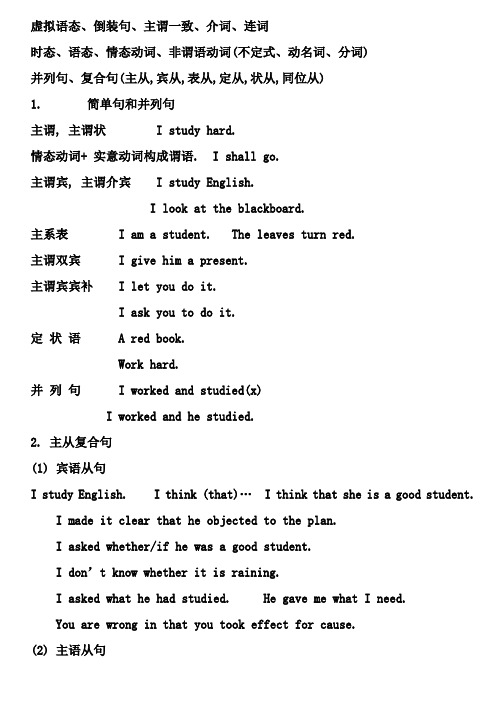
虚拟语态、倒装句、主谓一致、介词、连词时态、语态、情态动词、非谓语动词(不定式、动名词、分词)并列句、复合句(主从,宾从,表从,定从,状从,同位从)1. 简单句和并列句主谓, 主谓状 I study hard.情态动词+ 实意动词构成谓语. I shall go.主谓宾, 主谓介宾 I study English.I look at the blackboard.主系表 I am a student. The leaves turn red.主谓双宾 I give him a present.主谓宾宾补 I let you do it.I ask you to do it.定状语 A red book.Work hard.并列句 I worked and studied(x)I worked and he studied.2. 主从复合句(1) 宾语从句I study English. I think (that)… I think that she is a good student.I made it clear that he objected to the plan.I asked whether/if he was a good student.I don’t know whether it is raining.I asked what he had studied. He gave me what I need.You are wrong in that you took effect for cause.(2) 主语从句That the sun moves around the earth is the truth.( it is the truth that..)Whether it is raining is not known.It is not known--computers will one day have vision as good as human vision.A.whetherB. ifC. thatD. howIt goes without saying that we are not living in a traditional society. Who will come to the meeting remains unknown.翻译题: In a sense, what he said amounts to threat.(3) 表语从句Your greatest fault is that you are careless.The problem is what we should do to help him.(4) 形容词补语从句We feel proud that our team has won every match this year.He wasn’t sure whether he should stay or leave.Are you certain who he is?(5) 同位语从句(fact, news, idea, opinion, concern, hope, theory, decision, discovery, conclusion, report,order, question, problem, belief, truth, answer, statement, promise, possibility.)The news that he intended to come gave us much pleasure.(6) 状语从句时间状语从句When I studied, the bell rang.She was going upstairs when suddenly the light went out.He had no sooner died than/ he had hardly died when the family arguments began.地点状语从句He live where he liked.原因状语从句He was late because he missed the bus.Now that you mention it, I do remember.I’m in a slightly awkward posit ion, in that my secretary is on holiday at that moment.目的状语从句We have so arranged matters that one of us is always on duty.Bring it closer so that I may see it better.结果状语从句He brought a big house so( that) he had more space to paint in.He made such a good speech that he won warm applause.翻译题:The brothers looks so alike that it is difficult to tell them each other条件状语从句If I make a promise, I keep it.I’ll lend you the money , as/so long as you take my advice.These messages will become rubbish unless some measures have been taken. 让步状语从句Although/ though he was Spanish, he spent most of his life in Germany. Whatever/ No matter what happens, you must be calm and quiet.However/no matter how loudly you shout, you won’t be heard.方式状语从句I have changed the plan as you suggested.As if ( as though)比较状语从句(重点)She is as tall as Tom( is) I arrived as early as you (did)Mary was older/more careful than Tom( was)Mary works harder /more carefully than Tom( does)Bill speaks French ----( badly) than he writes it.The –( far)away we get from the earth, the thinner the air becomes. further进(8) 定语从句在从句中成份+连词She is a beautiful girl. I like the girl who is beautiful.( who主语) This is the film that I see.This is the boy who (whom)(--) you met yesterday. (主语)Tell me something about the man for whom I shall be working / (whom) I shall be working for.I read the book whose cover is red.You are still the same person as I knew ten years ago.I never heard such stories as he told.This is the day when( on which) I joined the league.This is the house where( in which) I live./ This is the house I live in. 非限定性定语从句:He met Mary, who invited him to dinner.I gave the book to Tom, whom/ who I found after the meeting.Her doctor, whose office was newly decorated, started to charge higherfee.His latest play, which was well reviewed by the critics, has been a great success.I called him by the wrong name, for which mistake I apologized.Prof. Emery, about whom everyone is taking these days.There are only four areas ____ very many diamonds have been found.A.whereB.whenC.thatD.whichWhere用在定语从句和状语从句的区别I’ll go to the place (where I live)I’ll go wherever work conditions are difficult.定语从句和同位语从句的区别The news (that our team had won)was known to all.This is the film that (I see).考题: Such people – you describe are rare nowadays.a. asb. thatc. whod.whichAnyone ---( want) to understand the industry of the future will have to know about IT . [who want]Who wants Many of us visited the industrial exhibition,---,to our disappointment, we saw very few high-tech products.a. whereb. whichc. asd. that3. 并列复合句He said that he would give up smoking, but nobody believe it.I never saw a busier person than she seemed to be; yet it was difficult to say what he she did.重点语法——动词的时态和语态时态的呼应I thought the experiment was going on now.She said this apparatus would be available next week.Am/is/are/+ done. This room is cleaned every day.Was/were +done This room was cleaned yesterday.Will be+ done This room will be cleaned.Am/is/are being done This room is being cleaned at the moment. Was/were being done This room was being cleaned when I arrived. Have/has been done My car has been repaired.Had been done The room looks much better. It had been cleaned. No sooner had I arrived at the theatre than the film began. Hardly….. whenSome people think that the relations between people have deteriorated-( deteriorate) so much that understanding and friendship are almost impossible.Nearly a week passed before the girl was able to explain what had happened (happen) to her.非谓语动词(1) 动词不定式做主语 To see is to believe.What to do next has not been decideIt is not easy to remember all these words.表语 To know everything is to know nothing.定语 This is a book to be written.宾语 I want to study.He found it impossible to keep silent any longer.宾补 They warned me not to be late.I let you do it(make, have, see, watch, notice, look at, observe, smell, listen to, hear,perceive)状语 Yesterday he came to see me.独立成份 To be frank, she is not my girlfriend.形容词补语 I am glad to hear the news.不定式的逻辑主语 For a bridge to collapse like that is unbelievable. 不定式的时态和语态 to do(be) , to be+p.p.to have done, to have been done动名词主,表语 Seeing is believingTom’s going there won’t do any harm.My hobby is collecting stamps.定语 This is a swimming poor. ( a poor for swimming)This is a hiding place ( a place for hiding )宾语 I enjoy studying (mind, keep, appreciate, can’t help, consider, postpone,suggest,admit etc.)Do you mind my smoking here?介词+ 宾语I used to doing. (confess to, look forward to, object to doing sth.) be involve in, consist of, be fond of, etc.动名词的时态和语态基本形同分词的时态和语态分词状语 When I saw the film, I felt sad = Seeing the film, I felt sad. Because it is Sunday today, we have no school.It being Sunday, we have no school.When the job was finished, we went home straight away.The job finished, we went home straight away.定语 The boy standing there is a classmate of mine.=The boy who is standing there is a classmate of mine.The used car. A broken cup the question involved.表语 The film is exciting. All the windows are broken.宾补 I found them watering flowers.( I found that they were watering flowers.I found the flowers watered. ( I found the flowers watered)分词的时态和语态.( 形同动名词)doing (being) being donehaving done having been done______nothing to say, the boy shield way form the crowd.A. HavingB. Have C Had. D. Having beingWhat developed was a music readily taking ( take) on various forms.Not having got (not get) enough hands, she had great difficulty in accomplishing the task.非谓语动词答题要点1. Anyone wanting (want) to understand the industry of the future will have to know about robotics.2.A Filipino maid was executed in Singapore after being convicted (convict)of murder.3. As research techniques become more advanced, the number of animals used( use) in experiments may decrease.Not have got (not, get)enough hands she had great difficulty in accomplishing the task.It is a well-known fact that a person will move in a circle when he cannot use his eyes to control ( control) his direction.As I’ll be away for a year,I’d appreciate hearing (hear)from you now and then.Object to , confess to , look forward to + doing.介词+ doing.If I had remembered --- the window, the thief would not have got in.a. to closeb. closingc. to have closed. having closed. Begin, start, intend, continue to do, doing 的区别不大The baby began crying. The baby began to cry.Try to do. 努力去做 Try doing 尝试去做.I was very tired. I tired to keep my eyes open, but I couldn’t.I can’t find anywhere to live.______, they began to get down to business. A. The holidays being over B. The holidays are over C. The holidays were over D. The holidays had been overV+ing及从句的固定用法It’s no use doing sth.It’s no use worrying about it. There’s nothing you can do.It’s (not) worth doing sth.Have difficulty doing sth.Spend time (in) doing sth.There is no doubt that.强调句1. 强调主语 It is I that/who am to blame2. 强调直接宾语 It was a glass that Mary broke.3. 强调间接宾语 It was him that I gave the pen to.4. 强调介词宾语 It is this room that I am living in.5. 强调状语1) 时间状语 It was last year that Tom graduated from high school.2) 地点状语 It was under the bridge that we found him.3) 原因状语 It was for his arrogance that I dislike him.4) 目的状语 It was for pleasure that I read it.不仅可以是陈述句, 还可以是疑问句和感叹句.Was it you that/who lost a watch yesterday? What great progress it was that you made.强调句可以是一个从句, 被强调的部分也可以是从句.I was told that it was because he hadn’t received the invitation that he didn’t comeIt was there, the police believe,she was able to activate the recorder she kept in her bag.A. thatB.untilC. whichD. when虚拟语气第一类型: 见词就填:A. (should ) do(should) beB. (should) be +过去分词第一类型虚拟语气 A第一类型虚拟语气 B见某些形容词要虚拟Urgent, necessary, important, possible, essential, incredible, natural, ridiculous, vital, imperative, crucial, critical, proper, compulsory, etc.形容词带的从句: It is important that every member (should) inform himself of these rules.主语从句: It is decided that the meeting (should) be postponed.宾语从句: He insisted that his daughter (should) come.表语从句: The doctor’s advice is that the patient (should) be kept quiet. 同位语从句: He gave order that the guests (should) be hospitably entertained.考题: They demanded that the right to vote----(give) to every adult person. [(should) be given]For a child to give up less mature idea for a more sophisticate one, it requires that the child ____ psychologically ready for the new idea.A.isB.beC.wereD.would be第二类型: if 的非真实条件句( 可能性小或没有可能)注意: if 可以引导真实条件句,多是条件状语从句.第二类型虚拟语气 (时态到推的概念)第二类型虚拟语气举例省略if 的倒装were, had , should.If the doctor had been available, the child would have been saved.Had the doctor been available, the child would have been saved.考题:_____for your help, I would not have overcome the psychological pressures and tensions.A. Had it not beenB. not beenC. Without beingD. not having been 特殊虚拟?Even if 形式上与if 相同Wish形式上大体与if 从句相同从句谓语与Wish同时 Wish+主语+V.ed/wereI wish I were as young as you.从句谓语发生Wish之前多用Wish+主语+had done(been)I wish that he had not made so much trouble.从句谓语发生Wish之后用Wish+主语+would(could) + v.I wish you would stay with me far a whileI wish I could fly.It is (about. High..) time that + 从句 (V.ed)It is high time that we began to work.In case, lest, for fear that (should)+ V.The mad man was out in the padded cell lest he ---himself.A. injureB. had injured c. injured d. would injure.Would rather =had rather, would just as soon, would sooner, would prefer 多加过去式表示尚未发生的动作.倒装句全部倒装 In came Jack. Now comes your turn.Among them were two girls.部分倒装Hardly/scarcely/barely had we got on the bus when it began to rain.No sooner had he put down the receiver than the telephone rang again.Not until many years later did the whole truth become known.Not only did he win the championship in the race, but he also broke the world record.Neither my sister nor I have traveled by air.Never, nowhere, no longer, little, feww, not…( not a single word) no. (at no time, by no means, in no way, on no account, under/in no circumstances) Only here can you buy fresh eggs.主谓一致要点To become actresses is their ambition.Nodding often means you say” yes.”What I did was to give her a book. Neither she nor I am wet.Many a student doesn’t like having to do their homework.连词连接代词 who, whom, whose, what, which, whoever, whatever, which ever 连接副词 when, how, why, where, whenever, wherever并列连词 and, but, or, so , therefore, yet, however, nevertheless, for, hence, as well as, both..and, not only..but also, either..or, neither..nor, 从属连词 after, when, before, as, while, since, until, till, although, though, if , even if, unless, lest, because, than, that, whether, so that, as soon as, as long as, in order that, as if, as though, in case, now that, so..that, such..that, as .as.When we play a game, we enjoy what we are doing, --- we should not play it.A. otherwiseB. insteadC. neverthelessD. either不定代词Any,one,none,nothing, neither, either, both, all, anyone, any one, some, any, much, manyAre you sure there are not--- sharks here? A.any B. some C. many D. much.Used to , be used to doingFrank lives alone,. He doesn’t mind this because has lived alone for 15years. So he is used to it. He is used to living alone.These days I usually stay in bed until late. But when I had a job, I used to get up early.词汇题常考动词搭配Come, carry, take, go,get,cut, make, put ,turn, bring.完型填空题型分析考察重点主谓一致,动词时态和语态,名词的数,代词,形容词副词的比较级,介词和连词.常用词语搭配.70%考连词,代词,介词以及承上启下的其他词和词组.方法: 先跳空通读全文,然后根据语法结构, 语义连贯,词与词的搭配填空, 最后在通读全文. 注意顾全大局.选的是最佳答案.词型填空题大部分为动词.阅读理解题型分析考察(1)词和短语的意义(2)句子表达的各个内容之间的关系(3)文章的主题思想和大意(4)文章或某句的内在含义及推理(5)文章作者的态度.答题方法:先看题—阅读的难点不是考试的重点,不要死扣一句,第一段和最后一段, 段首和段尾句,多数题目可以在文章中找到相应的段落,句子或短语.翻译题评分原则为:(1) 主要语法错误(如动词时态、语态、虚拟语气、主谓一致、否定、疑问以及其他句型错误)或影响基本句意的重要用词错误扣1分。
自考“英语(二)”完整讲义(146)

重点词汇: 1.scarce: a. 缺乏的,不⾜的;稀有的,珍贵的 e.g. Firewood is scarce in many parts of the world. 世界上很多地区都缺乏⽊材。
Scarce resources should be used sensibly. 稀有资源的使⽤应该合理。
2. expansion: n. 扩张,膨胀 派⽣词:expand v. 扩张,膨胀 e.g. Expansion into new areas of research is possible. 扩展到新的研究领域是有可能的。
3.promotion: n. 促进;提升 派⽣词:promote v. 促进,提升 e.g. As part of their sales promotion they‘re giving away a free pair of socks with each holiday. 作为促销的⼀部分,他们每个假⽇都免费赠送⼀双袜⼦。
4. award : vt. / n. 授予,给予,判给 e.g. He was awarded his damages by the court . 法院判给他损失赔偿费。
reward 意思是“报答,报应,报偿”。
⽽且reward 后⾯⼀般要加with . e.g. He was rewarded with $10000. 他被奖励10000 美元。
5.integrate v. 使结合,使并⼊,使成为⼀体 e.g. It‘s very difficult to integrate yourself into a society whose culture is so different from your own. 使你⾃⼰融⼊⼀个完全不同的⽂化⾮常困难。
6.diversity n. 多样性 e.g. Does television adequately reflect the ethnic and cultural diversity of the country ? 电视能充分反应这个国家种族和⽂化上的多样性吗? 7.permissive adj. 容许的,许可的,随意的,开放的 e.g. He claims that society has been far too permissive towards drug taking. 他认为社会对吸毒太放纵了。
自考“英语(二)”完整讲义(142)
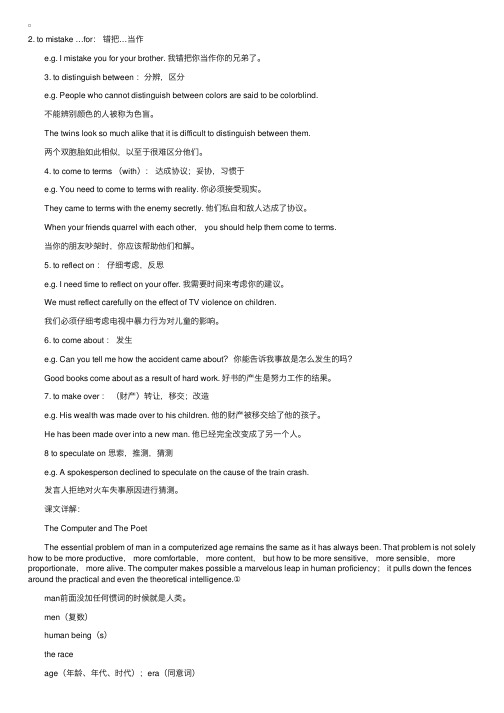
2. to mistake …for:错把…当作 e.g. I mistake you for your brother. 我错把你当作你的兄弟了。
3. to distinguish between :分辨,区分 e.g. People who cannot distinguish between colors are said to be colorblind. 不能辨别颜⾊的⼈被称为⾊盲。
The twins look so much alike that it is difficult to distinguish between them. 两个双胞胎如此相似,以⾄于很难区分他们。
4. to come to terms (with):达成协议;妥协,习惯于 e.g. You need to come to terms with reality. 你必须接受现实。
They came to terms with the enemy secretly. 他们私⾃和敌⼈达成了协议。
When your friends quarrel with each other, you should help them come to terms. 当你的朋友吵架时,你应该帮助他们和解。
5. to reflect on :仔细考虑,反思 e.g. I need time to reflect on your offer. 我需要时间来考虑你的建议。
We must reflect carefully on the effect of TV violence on children. 我们必须仔细考虑电视中暴⼒⾏为对⼉童的影响。
6. to come about :发⽣ e.g. Can you tell me how the accident came about?你能告诉我事故是怎么发⽣的吗? Good books come about as a result of hard work. 好书的产⽣是努⼒⼯作的结果。
自考0794综合英语(一)课程讲义全下册Lesson11
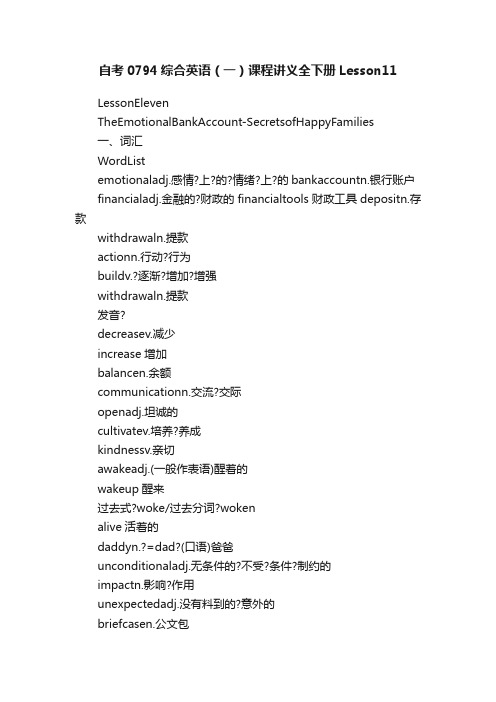
自考0794综合英语(一)课程讲义全下册Lesson11LessonElevenTheEmotionalBankAccount-SecretsofHappyFamilies一、词汇WordListemotionaladj.感情?上?的?情绪?上?的bankaccountn.银行账户financialadj.金融的?财政的financialtools财政工具depositn.存款withdrawaln.提款actionn.行动?行为buildv.?逐渐?增加?增强withdrawaln.提款发音?decreasev.减少increase增加balancen.余额communicationn.交流?交际openadj.坦诚的cultivatev.培养?养成kindnessv.亲切awakeadj.(一般作表语)醒着的wakeup醒来过去式?woke/过去分词?wokenalive活着的daddyn.?=dad?(口语)爸爸unconditionaladj.无条件的?不受?条件?制约的impactn.影响?作用unexpectedadj.没有料到的?意外的briefcasen.公文包earnv.获得?挣得capacityn.能力?才能capable有能力的?能干的becapableofdoing有能力做某事initiatev.使……开始?开始?着手sweetheartn.?夫妻之间或对孩子等的爱称?亲爱的?宝贝儿incrediblyadv.难以置信地loyaladj.忠诚的loyaltyn.忠诚beloyalto对谁忠诚nexttoprep.次于?居于……之后unawareadj.未意识到的?未觉察到的weaknessn.弱点?缺点ratheradv.更确切地说positiveadj.正面的?积极的?肯定的negative否定的thepositiven.值得肯定的地方overhearn.无意中听到?偷听到annoyv.使恼怒?使烦恼principlen.原则inprinciple原则上类似?principal首要的shiftv.转移defendv.维护?保护recallv.回想起?回忆起cabn.?美?出租汽车dragv.?时间?缓慢地流逝influentialadj.有势力的?有影响力的词根?influencen.acquaintancen.熟人ultimateadj.最终的?最后的channeln.途径,频道?海峡cleansev.使纯净obstaclen.障碍?物?consciencen.良心?道德心justifyv.证明?言语、行为等?正当、合理或公正?为……辩护miraclen.奇迹bamboon.竹子shootn.竹笋?嫩芽reachv.达到?到达dramaticadj.戏剧性的?重大的?戏剧的词根?drama形容词?dramaticgrowthn.生长supportn.支撑?支持二、课文分析1Theemotionalbankaccountislikeafinancialbankaccountinon eway:youcan make"deposits"-actionsthatbuildtrust-oryoucanmake"withdrawals"thatdecreaseit.感情银行储蓄和金融银行储蓄在一个方面是相似的?那就是你既可"存款"即做增加信任的举动?也可以"取款"?即做消弱信任的举动。
【免费下载】自考英语语法讲义及练习
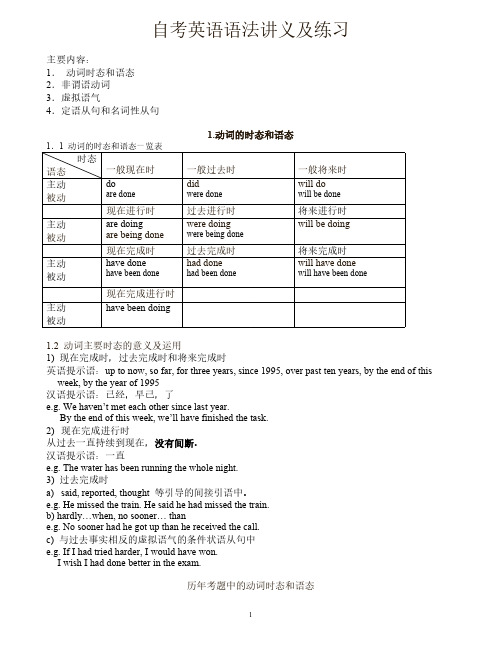
If we had got the news, we could have prepared earlier.If the job were to succeed, you should work harder.第二大类:从句中用过去时或过去完成时的虚拟语气1)would rather + 从句2)wish + 从句3)if only + 从句4)as if/ as though + 从句5)It’s time + 从句e.g. I would rather you didn’t tell me the story now.I would rather you had told me the story yesterday.第三大类:从句中用should加动词原形的虚拟语气,其中should可省略。
1)suggest, propose, advise, move(动议), ask, order, require, request, desire, insist, prefer 等动词后接的宾语从句;2)suggestion, proposal, advice, motion, order, requirement, request, desire, preference等名词后的同位语从句;3) important, necessary, essential, imperative, desirable, advisable, preferable 等形容词用在it is …that…句型中;4) lest, in case, for fear that 等引导的从句中。
e.g. It is suggested that the meeting (should) be put off.It is my suggestion that the meeting (should) be put off.It is necessary that the meeting (should) be put off.He came to the office earlier lest he (should) miss the important meeting.历年考题中的虚拟语气1.If it hadn’t been for your help, we ___ (be) in real trouble. Hewould have given you more help, if he ___ (not be) so busy.3.It is high time that we ___ (take) firm measures to protect ourenvironment.4.It was imperative that students ___ (finish) their papers beforeJuly 1st.5.They demanded that the right to vote ___ (give) to every adultperson. I would rather he ____ ( buy) the house next year. The manager told us to be friendly to the visitors as if we ___ (meet) them before.9.Should she come tomorrow, I ___ take her to the museum.[A] can[B] will[C] would[D] must10. If we ___ everything ready by now, we should be having a terrible time tomorrow.[A] hadn’t got[B] didn’t get[C] wouldn’t have got[D] wouldn’t getKey:1. would have been与过去事实相反的虚拟语气的主句2.had not been与过去事实相反的虚拟语气的从句3. took It is high time +过去式的虚拟形式4.should finish/finish It was imperative that+动词原形的虚拟形式5.be given demand所接宾语从句用动词原形的虚拟形式6.should have received与过去事实相反的虚拟语气的主句,表示“本应该收到”而实际上没有。
英语语法讲义(精简版)
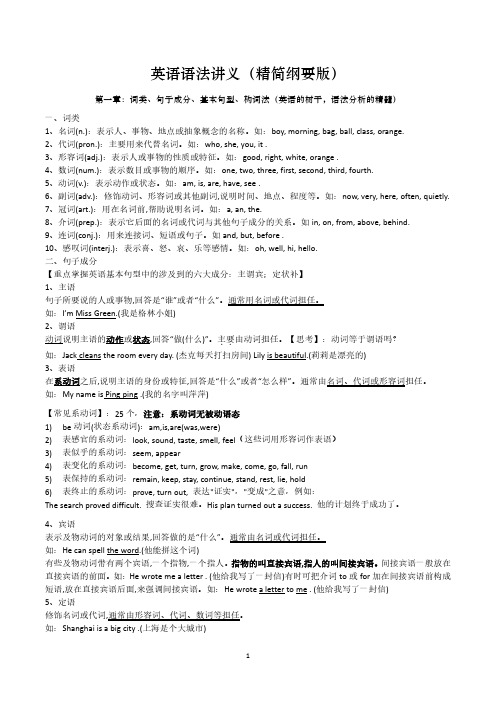
英语语法讲义(精简纲要版)第一章:词类、句子成分、基本句型、构词法(英语的树干,语法分析的精髓)一、词类1、名词(n.):表示人、事物、地点或抽象概念的名称。
如:boy,morning,bag,ball,class,orange.2、代词(pron.):主要用来代替名词。
如:who,she,you,it.3、形容词(adj.):表示人或事物的性质或特征。
如:good,right,white,orange.4、数词(num.):表示数目或事物的顺序。
如:one,two,three,first,second,third,fourth.5、动词(v.):表示动作或状态。
如:am,is,are,have,see.6、副词(adv.):修饰动词、形容词或其他副词,说明时间、地点、程度等。
如:now,very,here,often,quietly.7、冠词(art.):用在名词前,帮助说明名词。
如:a,an,the.8、介词(prep.):表示它后面的名词或代词与其他句子成分的关系。
如in,on,from,above,behind.9、连词(conj.):用来连接词、短语或句子。
如and,but,before.10、感叹词(interj.):表示喜、怒、哀、乐等感情。
如:oh,well,hi,hello.二、句子成分【重点掌握英语基本句型中的涉及到的六大成分:主谓宾;定状补】1、主语句子所要说的人或事物,回答是“谁”或者“什么”。
通常用名词或代词担任。
如:I’m Miss Green.(我是格林小姐)2、谓语动词说明主语的动作或状态,回答“做(什么)”。
主要..由动词担任。
【思考】:动词等于谓语吗?如:Jack cleans the room every day.(杰克每天打扫房间)Lily is beautiful.(莉莉是漂亮的)3、表语在系动词之后,说明主语的身份或特征,回答是“什么”或者“怎么样”。
自考英语语法讲义及练习

自考英语语法讲义及练习自考英语语法讲义及练习主要内容:1.动词时态和语态2.非谓语动词3.虚拟语气4.定语从句和名词性从句1.动词的时态和语态1.1 动词的时态和语态一览表时态语态一般现在时一般过去时一般将来时主动被动doare donedidwere donewill dowill be done 现在进行时过去进行时将来进行时主动被动are doingare being donewere doingwere being donewill be doing 现在完成时过去完成时将来完成时主动被动have donehave been donehad donehad been donewill have donewill have been done 现在完成进行时主动被动have been doing1.2 动词主要时态的意义及运用1) 现在完成时,过去完成时和将来完成时英语提示语:up to now, so far, for three years, since 1995, over past ten years, by the end of this week, by the year of 1995 汉语提示语:已经,早已,了e.g. We haven’t met each other since last year.By the end of this week, we’ll have finished the task.2)现在完成进行时从过去一直持续到现在,没有间断。
汉语提示语:一直e.g. The water has been running the whole night.3) 过去完成时a)said, reported, thought 等引导的间接引语中。
e.g. He missed the train. He said he had missed the train.b) hardly…when, no sooner… thane.g. No sooner had he got up than he received the call.c) 与过去事实相反的虚拟语气的条件状语从句中e.g. If I had tried harder, I would have won.I wish I had done better in the exam.历年考题中的动词时态和语态1. Much of the carbon in the earth ___ (come) from things that once lived.2.I n the past two decades, research ___ (expand) our knowledge about sleep and dream.3.S ome proverbs ___ (be) in the language for 1,000 years, for example, A friend in need is a friend indeed.4.___ (stand) at the gate was a young man in green coat.5.I n 1991, after the Gulf War, Bush’s approved ratingreached 91 percent, the highest level recorded since polling ___ (begin) in the 1930.6.S eeing violence on television or reading about it in the newspapers every day ___ (make) us tolerate crime more than we should.7.S o far, Irving ___ (live) in New York City for ten years.8.T he patient ___ (send) to another hospital before we got there.9.T he second half of the nineteenth century ___ (witness) the first extended translation into English of the writings of Eliphas Levi.10.All the worries they might have felt for him ___ (drive) off by the sight of his cheerful face.2. 非谓语动词2.1 动词主要时态和语态一览表非谓语动词形式意义现在分词一般式Doing 主动, 正在进行被动式being done 被动, 正在进行完成主动式having done 主动, 已经完成完成被动式having been done被动, 已经完成过去分词Done 被动, 已经完成动词不定式一般式to do主动,将要进行被动式to be done 被动, 将要进行完成主动式to have done 主动, 已经完成进行主动式to be doing 主动, 正在进行2.2. 非谓语动词作状语动词不定式:1)目的状语;2)结果状语e.g. I came here to meet you. (目的)He hurried to the rail station only to miss the train. (结果)分词:1) 伴随状语;2)原因状语;3)条件状语4)让步状语;5)时间状语e.g. Walking along the street, he met his old friend. (时间)Being v ery tired, my father didn’t go out with us. (原因)Made by hand, the silk shirt is very expensive. (原因)Seen from the space, the earth looks like a blue ball. (条件)2.3 非谓语动词,状语从句和独立结构1) Having done their homework, the children began to play. (分词作状语)2)After having done their homework, the children began to play. (连词+分词)3)After they had done their homework, the children began to play. (状语从句)4)With homework done, the children began to play. (独立结构)2.4 非谓语动词作定语1) If there is no choice, there is no decision ___ (make). (to be made)2)Do you know the man ____ ( stand) in front of the house? (standing)3)The question ____ (discuss) at the moment is very important. (being discussed)4)The bridge ____ (build) in the 1950s is still in good condition. (built)2.5 动名词和动词不定式*作主语和表语动名词作主语/表语表示一般、抽象的情况;动词不定时作主语表示具体某次的情况。
自考00831英语语法提分高频考点串讲
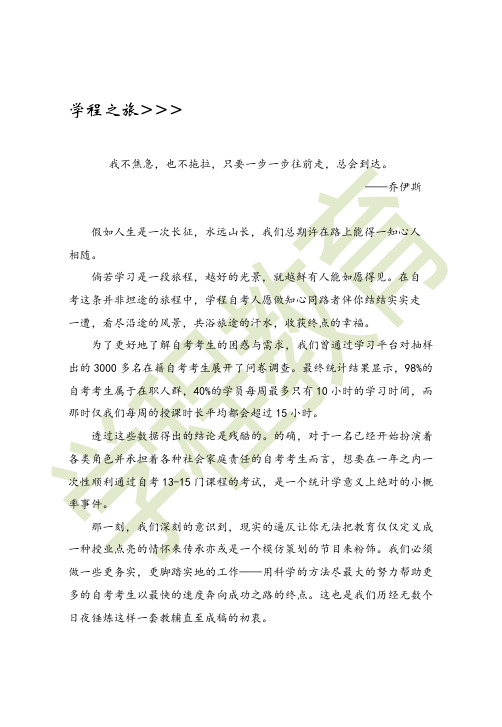
4
第一章 词性与句子成分 The male students learn American English.
carefully
当我们在 learn 前面加上 “carefully”时,它可以告诉你 learn 这个动 作的状态;
另外: She is beautiful.
very
当我们 beautiful 前加上 very 这个副词的时候,我们瞬间可以知道这个 形容词的程度。综上,我们可以知道状语最常用的即为副词---会出现在有 动词和形容词出现的地方;当然,副词还可以修饰整个句子,例如:
第一节:两类基础句子结构:
呢?我们将会在这一节当中解决上面我们提出的问题,同时,这 一部分,也是我们了解英语句子奥秘,提升阅读和写作能力的基 础单元。
1
学程自考提分档案
Xue Cheng Zi Kao Ti Fen Dang An
第一节:两类基础句子结构:
第一类
【主语 + 谓语 + 宾语】
名词
动词
三 考情分析
较之前的自考英语,改版后的新自考英语已经不再设置过多的单
纯考查语法的题型,更多的是把词汇和语法结合起来考查大家的英语知 识的综合运用能力。 而阅读量的显著增加则对大家语言的整体理解和把 握提出了更高要求。
鉴于这种变化,建议大家在尽快熟悉新题型的前提下,将词汇,语 法与新题型紧密结合,再集中精力在 30 分的写作。逐个突破,急,也不拖拉,只要一步一步往前走,总会到达。 ——乔伊斯
假如人生是一次长征,水远山长,我们总期许在路上能得一知心人 相随。
倘若学习是一段旅程,越好的光景,就越鲜有人能如愿得见。在自 考这条并非坦途的旅程中,学程自考人愿做知心同路者伴你结结实实走 一遭,看尽沿途的风景,共浴旅途的汗水,收获终点的幸福。
自考英语二讲义0603

自考英语二讲义0603III. 部分练习讲解P218 Bridging the GapDirections: Fill in the blanks with a word or a phrase that best completes thepassage. You may choose a suitable one from the list given.解题方法:把词分类动词形容词连词副词grow basic now that ideallyinvest wasteful wherecalled directaccumulateddirectMoney management can actually be broken down into a very simple practice thateven a fourth grader can do in his young life. The 1 basicstep to being on yourwealth path is knowing how much you really do need in your life and how you can2 invest the rest. If you are already working, arrange with your company to 3directa predetermined amount of your payroll(工资单)into a forced savings fund andthen you will learn to live with the rest. 4 Ideally, the amount that is leftfor you to work with is smaller, and this particular practice is actually 5called"learning to pay yourself first" - despite bills and other payables(其他应付款), you will come first.The beauty of this money management practice to get you on the wealth path isthat you will be forced to cut your 6 wastefulspending. You will learn to livewith what you have and figure out the little avenues(渠道)in your life 7 whereyoucan stop the financial leaks. With this, you will find that you have extra moneyto invest with. 8 Now thatyou have a sizeable amount, the next thing that youcan do is to figure out where to put the extras that have 9 accumulatedover timeso you can generate money and make it 10 growwith very little effort from you.There are many things you can find to put your money in.。
自考英语(一)讲义(6)

Unit 6 Text A Diamonds 搭配: 1. change sth. into sth. 把什么变成什么/动词词组 2. exist in 存在于/动词词组 3. mass of 团、堆、块/表量词组 4. become popular with/among sb. 受谁的喜欢,欢迎/动词词组 5. come at a good time 适逢其时/动词词组 6. be running out 渐渐⽤尽/动词词组 7. handfuls of 成捧的(东西)/表量词组 8. sort out 淘选出/动词词组 语⾔点: 1. be made from sth.指sth.已看不出原材料(如酒是⾼粱做的);be make of sth. 指sth.可以看出原材料(如桌⼦是⽊头做的) 2. it is thought that +从句⼈们认为 3. good enough for doing sth. 好到可以做某事 4. experience(n./v.)-experienced(adj.有经验的) 5. be classed as 被作为什么⽽分类/动词词组 6. the former…the latter 前者,后者 Text B The Difference between Plants and Animals 搭配: 1. tell A from B 辨别/动词词组 2. be satisfied with sb/sth./doing sth. 对什么/某⼈表⽰满意/动词词组 3. take place 发⽣(⽆法阻⽌的事情)/动词词组 4. lie in 存在于/动词词组 5. live on sth. 靠什么⽽⽣存/动词词组 6. work wonders 创造奇迹/动词词组 7. take in the riches 吸取精华/动词词组 8. suck up 吸收,吸取/动词词组 9. be different from 与什么不同 语⾔点: 1. There are many plants which have neither roots nor leaves nor flowers, while there are some animals which seem to have all three. (neither…nor句型表⽰两者都不) e.g. People who can neither hear nor speak talk to each other with the help of their fingers. (并列动词);My doctor told me I should neither smoke nor drink.(并列动词);She neither knows nor cares what has happened to her ex-husband. (并列动词) 2. 冠词问题:The blue haze,like smoke,is the dividing line between the heavens and the earth.(世界上独⼀⽆⼆的东西)。
- 1、下载文档前请自行甄别文档内容的完整性,平台不提供额外的编辑、内容补充、找答案等附加服务。
- 2、"仅部分预览"的文档,不可在线预览部分如存在完整性等问题,可反馈申请退款(可完整预览的文档不适用该条件!)。
- 3、如文档侵犯您的权益,请联系客服反馈,我们会尽快为您处理(人工客服工作时间:9:00-18:30)。
自考英语语法讲义及练习主讲人:胥国红主要内容:1.动词时态和语态2.非谓语动词3.虚拟语气4.定语从句和名词性从句1.动词的时态和语态1.1 动词的时态和语态一览表时态语态一般现在时一般过去时一般将来时主动被动doare donedidwere donewill dowill be done 现在进行时过去进行时将来进行时主动被动are doingare being donewere doingwere being donewill be doing 现在完成时过去完成时将来完成时主动被动have donehave been donehad donehad been donewill have donewill have been done 现在完成进行时主动被动have been doing1.2 动词主要时态的意义及运用1) 现在完成时,过去完成时和将来完成时英语提示语:up to now, so far, for three years, since 1995, over past ten years, by the end of this week, by the year of 1995汉语提示语:已经,早已,了e.g. We haven’t met each other since last year.By the end of this week, we’ll have finished the task.2)现在完成进行时从过去一直持续到现在,没有间断。
汉语提示语:一直e.g. The water has been running the whole night.3) 过去完成时a)said, reported, thought 等引导的间接引语中。
e.g. He missed the train. He said he had missed the train.b) hardly…when, no sooner… thane.g. No sooner had he got up than he received the call.c) 与过去事实相反的虚拟语气的条件状语从句中e.g. If I had tried harder, I would have won.I wish I had done better in the exam.历年考题中的动词时态和语态1. Much of the carbon in the earth ___ (come) from things that once lived.2.In the past two decades, research ___ (expand) our knowledge about sleep and dream.3.Some proverbs ___ (be) in the language for 1,000 years, for example, A friend in need is a friendindeed.4.___ (stand) at the gate was a young man in green coat.5.In 1991, after the Gulf War, Bush’s approved rating reached 91 percent, the highest level recordedsince polling ___ (begin) in the 19302.6.Seeing violence on television or reading about it in the newspapers every day ___ (make) ustolerate crime more than we should.7.So far, Irving ___ (live) in New York City for ten years.8.The patient ___ (send) to another hospital before we got there.9.The second half of the nineteenth century ___ (witness) the first extended translation into Englishof the writings of Eliphas Levi.10.All the worries they might have felt for him ___ (drive) off by the sight of his cheerful face.2. 非谓语动词2.1 动词主要时态和语态一览表非谓语动词形式意义现在分词一般式Doing 主动, 正在进行被动式being done 被动, 正在进行完成主动式having done 主动, 已经完成完成被动式having been done被动, 已经完成过去分词Done 被动, 已经完成动词不定式一般式to do主动,将要进行被动式to be done 被动, 将要进行完成主动式to have done 主动, 已经完成进行主动式to be doing 主动, 正在进行2.2. 非谓语动词作状语•动词不定式:1)目的状语;2)结果状语e.g. I came here to meet you. (目的)He hurried to the rail station only to miss the train. (结果)•分词:1) 伴随状语;2)原因状语;3)条件状语4)让步状语;5)时间状语e.g. Walking along the street, he met his old friend. (时间)Being very tired, my father didn’t go out with us. (原因)Made by hand, the silk shirt is very expensive. (原因)Seen from the space, the earth looks like a blue ball. (条件)2.3 非谓语动词,状语从句和独立结构1) Having done their homework, the children began to play. (分词作状语)2)After having done their homework, the children began to play. (连词+分词)3)After they had done their homework, the children began to play. (状语从句)4)With homework done, the children began to play. (独立结构)2.4 非谓语动词作定语1) If there is no choice, there is no decision ___ (make). (to be made)2)Do you know the man ____ ( stand) in front of the house? (standing)3)The question ____ (discuss) at the moment is very important. (being discussed)4)The bridge ____ (build) in the 1950s is still in good condition. (built)2.5 动名词和动词不定式*作主语和表语动名词作主语/表语表示一般、抽象的情况;动词不定时作主语表示具体某次的情况。
e.g Rising early is good for health.To rise early tomorrow is difficult for me.It is difficult for me to rise early tomorrow.My biggest wish is to go abroad.Seeing is believing.*作宾语接动名词作宾语的动词:admit, acknowledge, avoid, appreciate, consider, delay, enjoy, escape, excuse, forgive, finish, include, involve, mind, put off, postpone, suggest, feel like, look forward to, be used to, be accustomed to, etc.接动词不定式作宾语的动词:want, tend, intend, pretend, hope, plan, expect, be supposed to, seem, be likely to, used to, be willing to, desire, force, prefer, start, begin接动名词和动词不定式有不同含义的动词:5)forget, remember, regret6)stop, continue7)need/ want8)allow doing/ allow sb to do1) How can I forget meeting you for the first time?Sorry, I forgot to lock the door.2) I can’t stop laughing. Can you stop to give me a hand?3)The grass needs cutting. The grass needs to be cut.4)We don’t allow smoking here. You a re not allowed to smoke here.历年考题中的非谓语动词1. A man cannot be really happy if what he enjoys ___ (do) is ignored by society as of no value orimportance.2.Anyone ___(want) to understand the industry of the future will have to know about robotics.3.It is a well-known fact that a person will move in a circle when he cannot use his eyes ___ (control)his direction.4.As research techniques become more advanced, the number of animals ___ (use) in experimentsmay decrease.5. It seems reasonable to assume that, other things ___ (be) equal, they would prefer single to sharedrooms.6. This poem, if ___ (translate) word for word into Chinese, will make no sense.7. They may have their passports _____ (remove), making leaving or “escaping” actually impossible.8.Her body, with hands and feet ____ (bind), was discovered by a traveler early in the morning.9.I couldn’t help but ___ (feel) this is a very strange life.10.Let us consider the earth as a planet ____ (revolve) round the sun.Key:1. doing 动名词做enjoy的宾语2. wanting 现在分词作定语3. to control 动词不定式作目的状语4. used 过去分词作定语5. being 现在分词用在独立结构中6. translated 连词加过去分词作状语7. removed 过去分词作宾补8. bound 过去分词用在独立结构中9. feel couldn’t help but 后接动词原形10. revolving 现在分词作定语3. 虚拟语气第一大类:非真实条件下的虚拟语气时间从句主句与现在事实相反did/ were should/could/would + do与过去事实相反had done should/could/would + have doneshould/could/would + do与将来事实相反were to doshould doe.g. If I were you, I would be happy to do it.If we had got the news, we could have prepared earlier.If the job were to succeed, you should work harder.第二大类:从句中用过去时或过去完成时的虚拟语气1)would rather + 从句2)wish + 从句3)if only + 从句4)as if/ as though + 从句5)It’s time + 从句e.g. I would rather you didn’t tell me the story now.I would rather you had told me the story yesterday.第三大类:从句中用should加动词原形的虚拟语气,其中should可省略。
